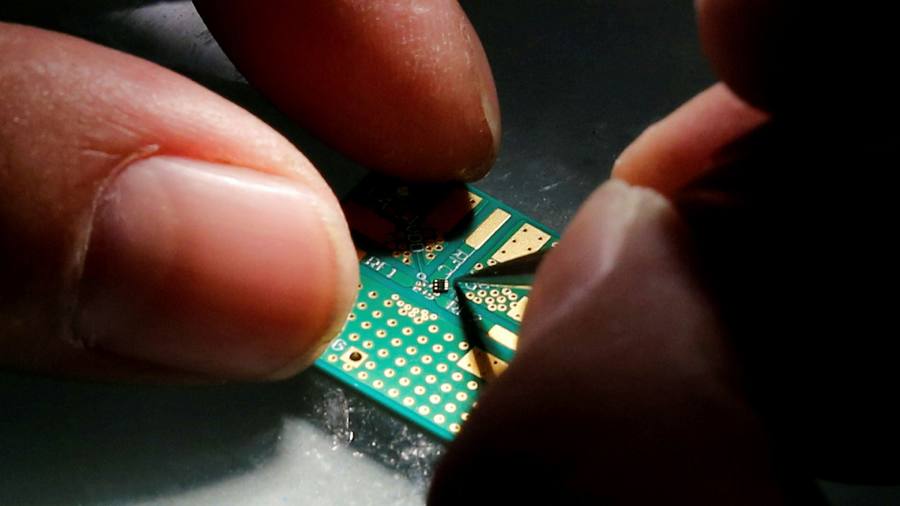[ad_1]
International bondholders owed tens of millions of dollars by a Beijing-backed semiconductor group are seeking to freeze its overseas assets, as corporate debt problems complicate President Xi Jinping’s attempts to unshackle China from foreign-made chips.
Tsinghua Unigroup, a national chip champion backed by China’s most prestigious engineering school, in November defaulted on a domestically issued bond, triggering concerns over cross-defaults of offshore notes worth about $2.4bn.
The state-backed company sits at the heart of Xi’s efforts to achieve self-sufficiency in semiconductor production. The US has restricted Chinese companies from accessing foreign-built chips amid broader tensions between Washington and Beijing. But now Tsinghua’s problems threaten to embroil a clutch of China’s most important computer chip companies, which it either owns or has stakes in.
Lawyers representing a Hong Kong-based group of Tsinghua bondholders in February issued a statement of claims in the city’s high court, according to documents seen by the Financial Times. That marked the first step to “put a hold on offshore assets†owned by Tsinghua before any moves inside China to restructure the company, said one person involved in the case. If successful, the order could prevent Tsinghua from selling offshore assets and using the proceeds to pay off debts in China.
“If we manage to do that, then those [assets] shouldn’t go into the onshore restructuring,†the person said, adding that the exact value of Tsinghua’s offshore assets was not clear, nor had the company communicated plans to tackle its debt problems.
Tsinghua did not respond to requests for comment by the FT.
Tsinghua’s liabilities as of June 2020 stood at Rmb202.9bn ($31.2bn) with about one-quarter of that due by the middle of this year, according to Debtwire data based on company filings.Â

The group’s debt problems also throw a spotlight on Zhao Weiguo, Tsinghua’s chair. The aggressive dealmaker, who journeyed from life as a shepherd in western China’s Xinjiang region to studying at Tsinghua University, made his fortune in property and has forged ties with senior members of the Chinese government.Â
Under Zhao, whose Beijing Jiankun group owns a large stake in Tsinghua, the chip group embarked on a years-long deal spree that included the purchase of French chipmaker Linxens as well as a majority stake in data networking business H3C from Hewlett-Packard. Multibillion-dollar bids for US tech groups Western Digital and Micron Technology failed.
Zhao’s investments have dovetailed with Beijing’s intensifying efforts to free itself from dependence on foreign-made computer chips. In 2017, Tsinghua secured $22bn in new financing from state investors to help fund semiconductor-related acquisitions.

But it is unclear if Xi’s administration would bail out Zhao, analysts said.
According to Cercius Group, a Montreal-headquartered consultancy specialising in elite Chinese politics, Zhao benefited from state backing during the administration of Hu Jintao and he continues to have a close personal relationship with the former president’s son, Hu Haifeng. But there are tensions between Hu Jintao and current president Xi, clouding the picture.
Six China-based analysts declined to comment to the FT on Tsinghua’s debt situation.
Douglas Fuller, an expert on China’s industrial policy in the chip sector at the City University of Hong Kong, said Tsinghua was ultimately “a bad choice as the vehicle through which to build China’s chip industryâ€.
Fuller believes the group “overpaid†for two chip design groups, Spreadtrum and RDA Microelectronics. The pair were eventually merged into one “underperforming†unit, he added.
ChangXing Memory Technologies and Yangtze Memory Technologies, two important chip affiliates of Tsinghua, “should prove viable . . . but they will not displace any of the big global players in these markets any time soonâ€, Fuller added.
The group’s issues are not unique to the sector. One Chinese chip executive from a group unrelated to Tsinghua said companies and local governments are struggling to find new funding for the industry. “So far, there is no possibility of profiting. It is very difficult to maintain cash flow. I don’t know how long we will last,†he said.
The foreign holders of Tsinghua’s bonds say part of their motivation for starting the Hong Kong court proceedings is to try and provoke more transparency from the company.
The case is also complicated by the difficulties foreign investors face in pursuing debts from China-based groups, even from Hong Kong, which has fallen increasingly under Beijing’s control.
“There’s not much protection we can get, the company being an onshore entity — the offshore legal structure doesn’t work onshore,†said the person involved in the case.
The legal proceedings are also likely to be closely watched by other investors in Chinese bonds issued offshore from the mainland. Chinese non-financial companies owe $575bn in offshore dollar-denominated debt, with $72bn maturing this year, Dealogic data show.Â
A large proportion of the borrowing is by the property sector, which has $34bn of bonds maturing in 2021. China Fortune Land Development, which specialises in industrial parks, this month defaulted on a $530m bond that counted BlackRock and HSBC funds among its investors.
Additional reporting by Sherry Fei Ju in Beijing and Qianer Liu in Shenzhen
[ad_2]
Source link





